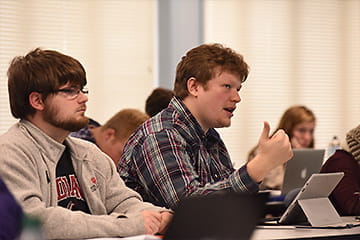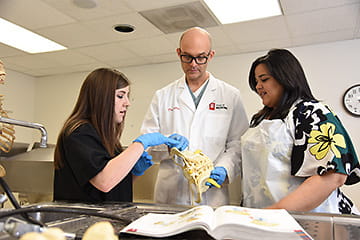The IU School of Medicine Department of Surgery trains third and fourth-year medical students on surgical knowledge and care fundamentals. A 3G Sim Man at Fairbanks Simulation Center offers a simulated patient experience that includes acute problems for students to perform a focused assessment, form an apposite diagnosis and execute the appropriate treatment.
Patient Experience
 Third-Year Clerkship
Third-Year Clerkship
The surgical block during the Phase 2 curriculum is eight weeks of curriculum that involves four weeks of general surgery exposure and four weeks of exposure to subspecialty surgery. During the eight-week surgical block, students may find themselves assigned to one of the school's statewide campuses. Regardless of campus placement, students will participate in weekly didactic sessions to ensure comparability of learning outcomes as specified by the ACS/ASE Medical Student Core Curriculum.
During the four weeks of the general surgery, students will spend time with their clinical teams to experience the many facets of general surgery. During this time, students will also participate in small group learning sessions both in a clinical and classroom setting. The subspecialty portion of the rotation will have the student rotating with one of nine chosen specialty services around the state.
In accordance with the work-hour policy for third-year medical students at IU School of Medicine, the Department of Surgery honors ACGME guidelines for work hours. The surgical clerkship coordinator will review student logging data in MedHub weekly to determine work-hour violations and adjust student exposure in observance of work-hour limitations. In addition, logging of required clinical encounters in MedHub allows the department to shift students to needed areas of exposure when deficiencies in experience exist.
Video
IU School of Medicine Surgery Clerkship
The Department of Surgery trains third- and fourth-year medical students on the fundamentals of surgical knowledge and care.
Fourth-Year Experiences
The Department of Surgery offers a Phase 3 General Surgery Sub-I experience, as well as various fourth-year clinical electives, exposing medical students to subspecialty areas of surgery, including hepatobiliary, pancreatic, minimally-invasive, breast, plastic, thoracic, cardiovascular and transplant procedures through one-month electives. Students are integrated into the resident team and aid in all aspects of patient care and operative intervention. Additional electives are available for specialized experiences in ICU care, pediatric surgery, burn surgery and trauma surgery.
The Surgical Research Electives offer an introduction to surgical research in clinical settings. Surgical faculty offer opportunities in basic science and clinical research. Participation in the research work of the surgery team’s laboratories for general surgery, pediatric surgery, cardiovascular or transplant surgery exposes medical students to ongoing bench, translational, and clinical research projects. While the research focus of each lab varies among investigators, studies may involve in vitro or in vivo, as well as human clinical trials and retrospective case review models. Students may be exposed to and perform basic biochemical techniques, including ELISA, Western Blot, and other processes. In addition, after appropriate training, a student may participate in animal studies which may involve surgical procedures. Students in the surgery team’s fourth-year electives may participate in ongoing clinical studies at the time of the rotation, and they will participate in group lab meetings and have individual meetings with the primary investigator of the lab in which they’re rotating.
The Transitions 3: Surgery course run during March of every year prepares medical students who plan to match into a surgical internship. In a small-group demonstration and discussion basis, students can refine suturing skills, experience invasive techniques such as endoscopy, broaden trauma assessment acumen, and expand techniques for evaluating scientific literature.
The Transitions 3: Surgery curriculum includes a Residents as Teachers lecture series; cadaver labs experience for reintroducing surgical anatomy to perform common operations at the intern level; common techniques, including thoracostomy tube, central line placement, chest tube placement and advanced airway management; surgical patient simulation scenarios done at Fairbanks Simulation Center with a 3G Sim Man; laparoscopic skills training on fundamentals of laparoscopic surgery (FLS) trainer boxes; ultrasound in trauma session reintroducing the Focused Assessment with Sonography in Trauma (FAST) method to students; mock page scenarios; lecture series covering various surgical topics; and lunch sessions with the interns and chief residents.
Questions?
For questions relating to medical student education, please email us.